#Standard Homogenizer
Explore tagged Tumblr posts
Text
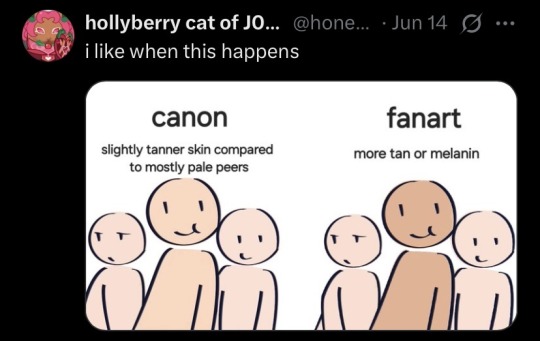

one of the coolest things the hypmic fandom does collectively ngl lol
#vee queued to fill the void#eng side i mean lol jp side is for the most part faithful to canon skin tones#hitoya too i just add too much extra filter shit on my art for it to be featured lol#i’m pretty by the books when it comes to interpreting characters#so i always find it charming seeing tanned versions of the characters who don’t have any deviation from standard peach lol#like once upon a time ago i used to give kuukou melanin lol#but these are my most obvious ones lol#i only have bat and ichiro’s colour palettes saved since i draw them the most but i do try to vary skin tones from character to character#bc what’s the point in humans having different skin tones even in ‘homogeneous’ countries and not mess around with them lol
27 notes
·
View notes
Text
not against the proliferation of pitch correction in the sense that i think it's somehow ""cheating"" or that i care if someone edits their vocals in any way but incredibly wary of the assumptions that seem to underlie its near ubiquitous use; that the perfectly pitched version of a song is necessarily the most beautiful version and that the most beautiful version is necessarily the artistically superior one. assumptions which i feel have terrible implications for both the quality of the art and the self-image of artists
#like. i don't care at all if someone wants to tweak their pitches. and the idea that that's somehow ungenuine or makes them somehow less#competent as an artist or as a vocalist is ridiculous#but i feel the ubiquity of pitch correction points towards an attitude towards vocals and art as a whole that i strongly disagree with#which is this idolization of a standardized and homogenized idea of beauty. and it's doubly frustrating when aimed at something#like singing where on an incredibly basic level the art form is characterized by the fact that every voice /is/ unique#completely off-topic post for this blog haha. this has just been on my mind a lot recently#bc i just. hear a lot of music that i feel is being held back by being pitch corrected. but so many critiques of pitch correction are#bullshit about artists not being ''''genuine'''' or ''''not /actually/ being able to sing'''' whatever that means#and i wanted to articulate the feeling that the issue isn't pitch correction in and of itself it's the undue value being placed on the fact#of a pitch being correct. ok sorry rant over
11 notes
·
View notes
Text
"the preteens are running around sephora because all their third spaces are gone!" i get that but did you know. did you know that there is an age appropriate store for young girls selling (fake) makeup & accessories. are you reasonable enough to understand that 10-12 year old girls do not need to be running around an adult makeup store ruining displays, destroying products, & generally leaving the stores a mess? all while they harass employees & disrespect them. the real solution obviously is to make 3rd spaces accessible again but until then keep your CHILD out of sephora unless you are right there with them & able to fucking parent.
#rae.txt#and stop giving them fucking giftcards to makeup stores !!!!#like this whole debacle is making me soooo anti makeup at this point#bc WHY do these young girls think they need skin care routines !!!! why is society pushing this on them so young !!!#my sister is 19 & grew up in the age of beauty influencers & i watched her grow up faster than she should have#she has tons of makeup she doesnt use & only buys bc shes influenced ! literally has money burning a hole in her pocket daily#i just. most makeup looks these days arent about self expression its all about homogenizing women's looks#to european beauty standards. and to do it well you have to destroy your skin on the daily.#sorry to be a crazy feminist on main but i do think the beauty industry has done irreparable damage to the feminist liberation movement.#ok ill stop now.
12 notes
·
View notes
Text
i went looking for examples of Ohio River valley area accents and found this one which was pretty good and close to how i talk
Cincinnati Accent (video)
But the Hoosier Apex is probably the closest thing since well, that's where I've been trapped all my life lol
rb this and tell me what ur accent is. this has no purpose except the fact i just realized i could have like... mutuals with cockney accents or newfoundland accents or something and thats just wild
#'average american' is basicaly disney channel yeah lol#< yeah actually there's a. hmm#homogenized pan-American accent you hear usually on national news#national channels etc#so yeah Disney channel accent#personally. hm. Ohio River valley. i was told by people close to Louisville KY i have a northern accent lmao#I've been letting myself slip out of the standardized accent and it's very freeing. little bit of a laziness of the lips to it#sometimes sharper vowels sometimes smash the consonants together#i love finding out where people are from and how they pronounce <town name>#linguistics stuff
168K notes
·
View notes
Text
#Homogenizer Pressure Gauge#Differential Gauge#Digital Pressure Gauge#Digital Temperature Gauge#pressure gauges#low pressure gauge#differential pressure gauge#standard pressure gauge#electric pressure gauge#economical pressure gauge#diaphargm seal pressure gauge#All SS Pressure Gauge
0 notes
Text
victim of British colonialism: I just had to buy a 4-hole punch and a 4-ring binder
#forcibly assimilated into a demonstrably worse culture#you'd think I'd be over it by now but I am not#all because I couldn't find my noble 3-hole punch and thus was forced to acquire one of their degenerate 4-hole punches#I could have bought a 3-hole punch here and there are even a few 3-ring binders available#but I can only get A4 paper (210x297mm)#which won't fit in a _normal_ 3-ring binder made to hold 8.5x11 (216x279mm)#or into a 3-hole punch made for 8.5x11 paper#-- ie basically all 3-hole punches#so you can see how this is just one annoyance after the next#can we just get some global standards on these things#we've already ruined & homogenized national costume pretty much worldwide#so I know it's possible#let's turn our efforts to things that really matter like the number of rings in a binder#and the shape & location of search boxes on web pages#OK yes it's true that I could only have used my noble 3-hole punch until I had to buy more paper#and was thus forced into the A4 situation#but 4 HOLES -- unseemly to say the least#ETA: wait it looks like I can buy overpriced 8.5x11 paper here vive la résistance
6 notes
·
View notes
Text
I don’t know how to explain to you how insane and antimulticultural it is to act like innocent people from other countries have to consult with your culture before feeling emotions about mass killings.
#You guys realize that instead of respecting others you are demanding homogenization#particularly to the cultural standard you feel is superior#right?
0 notes
Text

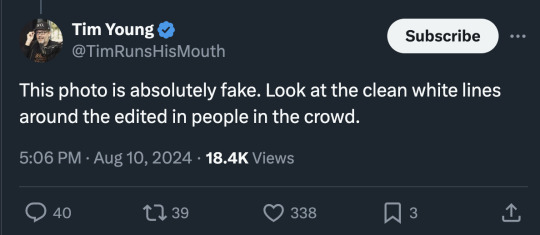

I think in this new age of A.I. the general public is going to need to increase their photography and lighting literacy. The response to this photo has just been a shit show.
There are people pointing out perfectly normal edge lighting and misunderstanding how reflections work.



First the plane is parked at an angle. The tail is farther back than the nose. But also that is a curved surface and it tapers. It's reflecting the area to the right of the photo.
And the bottom of the plane is reflecting what is directly underneath. Which is the tarmac, not the crowd.
It should also be noted that photo was shot with a very telephoto lens and everything is super compressed. The crowd appears much closer to the airplane than they actually are.
But then someone who should have good understanding of lighting said this...
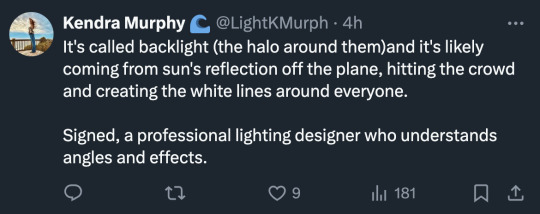
And now I'm worried for her clients. Because that's very... wrong.
Well, wrong-ish.
First, let's try to understand why this photo is setting off some alarm bells.

The crowd toward the rear is in shadow, but they are still very well exposed. But then there is also a bright light source creating a strong edge light on them. Looking at this photo with just the context of what is in it, there are some things that seem uncanny.
The information we do not have is the people in the shadow area are inside a very brightly lit airplane hangar.

So they have artificial light blasting them from the top.
But that light is still much dimmer than the sunlit areas outside so they appear in shade. But we are used to shade being much darker than areas in direct sun. So the balance seems off in our brain. We expect the people to be darker because we don't have the context of the bright hangar lights above them.
But the other issue is that the photo was post processed. It wasn't manipulated. The pixels weren't changed. But the exposure balance was altered.
If I were to guess, the original photo looked more like this...

But newer digital cameras can have 13 to 15 stops of dynamic range. And if you shoot in RAW, you can easily lift shadows and bring down highlights. You can balance the exposure so the dark parts aren't as dark and the bright parts aren't as bright. This photographer might have overdone it a bit in this case, but this is a fairly standard edit used to bring balance to photos.
And lastly, where does the edge light come from?
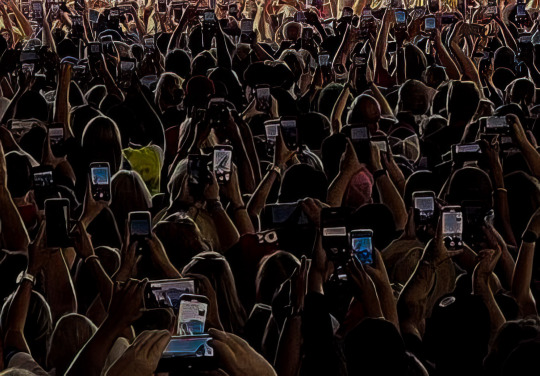
Edge lighting or backlighting or rim lighting (all the same) should probably be called wrap-around lighting if you want to be more accurate.
It comes from a homogenous light source that is larger than the subject being lit. So with my knife photo, I placed it on a large LED panel light.

The light source was bigger than the subject so it wrapped around the edges.
And I'm afraid the airplane is not nearly large enough to create a light source to wrap around everyone in the crowd. It isn't even reflecting direct sunlight. So I'm sorry to say that lighting designer was mostly mistaken despite the confidence.
The light source is... everything.

That entire red area I highlighted is the light source.
As well as everything above and everything to the sides.
And the biggest aspect of that light source would be the sky above. I think people always forget the sky is a light source. If you are seeing blue, you are seeing light. And I guess the plane is included in that, but that entire highlighted red area is so bright, and so filled with sunlight bouncing around, that it creates basically a giant softbox. It becomes a huge single light source for the people in the hangar.
If you look at footage taken from way inside the hangar, you can see the camera adjusting exposure for the crowd inside, but look at what happens to the sunlit area outside.

What does that look like?
A giant softbox.
A single homogenous light source blasting light inside the hangar.
The sun is so incredibly bright that even when it is not directly lighting something, the light just bouncing around outside is enough to overpower the very bright hangar lights.
So, what have we learned from this?
Perhaps people should hire me to be their lighting designer.
Though I'm sure she is actually very talented. She seems to work with stage lights and this is more physics and photography.
Phystography.
4K notes
·
View notes
Text
Not Just a 'Stylist' | Bangchan 1.1k Followers special!! <3



Pairing: Bang Chan × Stylist!Reader
Word Count: 9,145 Words | Reading Time: 33-ish mins
Genre: Angst | Slow Burn | Hurt/Comfort | Idol AU | Romance
Trope: Second Chance · Miscommunication · Lovers to Strangers to Lovers · Forbidden Love
Warnings: Mentions of body image issues & industry pressure, Angst-heavy themes, Harsh words, emotional fallout, Mental health struggles (insecurity, self-hate), Mild suggestive content, Strong language, NO PROOF READING WAS DONE
Synopsis: She was never just their stylist. She was the one who made sure their voices were heard—even if it meant putting herself in the line of fire. Bang Chan didn’t know how much she mattered until she walked away. Now, two years later, a sly plan, an awkward reunion, and a very overdue confession might be what brings them back to each other… if their wounds can finally heal.
Author’s Note: This one’s for the parts of us we try to hide—because insecurities aren’t flaws, they’re just softer truths we haven’t learned to love yet. Chan’s story in this fic is a reminder that vulnerability doesn’t make you weak; it makes you human. And that’s where the real beauty lives. 🤍 I hope all are doing fine! {I know i was gone for a little too long! Sorry lovies, i was trying to heal and keep up with myself first cause it was reflecting on my writings and i didnt wanna write so much angst, i haven't been feeling to write and post since a few weeks its just complicated lol, i hope its just a phase... And i am sorry if this one is a bit of more angst than fluff..}
Notice: Requests a closed for a little while, if y'll wanna talk or share thoughts feel free to do so!!
-
The K-Pop industry was a dazzling, often bewildering, kaleidoscope of vibrant colors, synchronized choreographies, and the relentless hum of constant activity. For many, it was a dream factory, churning out idols worshipped by millions. But beneath the glittering facade lay grueling schedules that stretched days into sleepless nights, and an often unforgiving set of beauty standards that could strip an idol of their individuality faster than a stage light could flicker. Perfection, in this world, was not just admired; it was meticulously engineered, often at the cost of authentic self-expression. Yet, for you, a stylist barely two years into the unforgiving depths of this demanding world, it was also something far more profound: a blank canvas, ripe for a quiet, yet revolutionary, change.
You hadn't simply landed in the K-Pop scene; you had carved out a niche, not with aggressive self-promotion, but with a philosophy that was both innovative and deeply empathetic. Your reputation had spread like wildfire, not just for the avant-garde, trend-setting ensembles you conceptualized, but for an almost fierce, unwavering dedication to the idols' comfort, well-being, and genuine self-expression.
In an industry obsessed with a narrow definition of perfection, your rebellion was subtle but potent. Whitewashing, the pervasive practice of lightening an idol's skin to an often unnatural pallor, was your personal nemesis—a cultural erasure you fought tooth and nail against.
You saw it as a deliberate act of stripping away an idol's natural heritage and unique beauty. Unnecessary layers of makeup on already flawless, youthful skin felt like a crime against nature and authenticity, smothering their natural glow under a mask of heavy product. And the rampant destruction of natural hair, often through harsh chemicals, relentless heat styling, and aggressive bleaching, was a personal affront you simply could not tolerate.
You championed originality, seeing each idol as a unique individual with their own inherent beauty to be amplified, not erased. Your mission was to ensure they felt seen, celebrated, and authentically themselves, rather than merely being packaged into a marketable, albeit homogenous, product designed to fit a preconceived mold.
This philosophy, initially met with skepticism and quiet resistance from management, slowly began to take root among the idols themselves. The members, accustomed to a more rigid, company-driven approach to their appearance—where they were often told what to wear, how to pose, and even how to smile—gradually adjusted to your radical kindness. They started to trust you, to see you not just as a technician of trends, but as an ally, someone who genuinely had their best interests at heart. Slowly, tentatively, some even began to confide in you, whispering their preferences, their discomforts, their secret desires for a different look, a softer fabric, a bolder color—preferences you always, without fail, honored and fought for, often pushing back against directives from higher-ups.
Among them was Han, a whirlwind of creative energy, known for his rapid-fire raps and boundless stage presence. Beneath his vibrant exterior, he carried a canvas of intricate tattoos that told stories only he truly understood, a deeply personal expression of his journey. He had silently endured countless applications of heavy, industrial-strength body tape, used to conceal his art for various concepts, leaving his sensitive skin raw, red, and irritated after every single performance. It was a silent agony he'd simply accepted as part of the job.
One afternoon, after a particularly long photoshoot for a new album, Han approached you cautiously, a faint wince on his face as he gently peeled a corner of tape from his inner arm. "Hey, [Y/N]," he began, his voice low. "Could… could we possibly try something different with this next time? The tape… it's really tearing up my skin." He showed you the angry red marks, some already forming blisters.
You immediately knelt, examining his reddened torso with a frown. "Oh, Han, that looks painful," you murmured, your concern genuine. "Of course, we will. Show me exactly where it hurts, where the tape causes the most irritation. We'll find a way around it, I promise. Your comfort comes first, always." From that day on, you made it your unwavering mission to ensure his clothing was stylish, often strategically covering him in ways that felt natural and chic, using round tops and under mesh that seamlessly integrated into the concept. But there were times, moments of pure, unadulterated playfulness on stage or during content shoots, when Han, swept up in the moment, wanted to show off his tattoos, to let his true self shine through. In those instances, you would take the fall, absorbing the inevitable scoldings and frustrated sighs from management with a calm, unyielding demeanor, a silent shield protecting his artistic freedom and personal comfort. You were their advocate, their quiet guardian against the industry's more suffocating demands.
Yet, despite your growing influence and the trust you had cultivated with most of the members, there was one who struggled profoundly to adapt to your different approach: Bang Chan. The group's leader, he was the embodiment of tireless dedication and relentless self-improvement, but years of relentless industry conditioning had deeply ingrained a specific, often self-deprecating, image in his mind. He couldn't reconcile with the idea of embracing his natural curly hair, which he saw as unruly, messy, and unprofessional, a stark contrast to the sleek, sharp looks favored by many K-Pop idols. Similarly, his slightly tanned, sun-kissed skin, earned from hours in the dance studio and occasional outdoor filming, was something he believed detracted from the desired "idol aesthetic" of pale, ethereal beauty.
After a particularly bright outdoor shoot under the Seoul sun, Chan approached you, rubbing his arm with a towel, a hesitant smile on his face that didn't quite reach his eyes. "Hey, [Y/N]," he said, almost apologetically. "Could we… maybe go a bit lighter on my skin for the next concept? Like, a foundation shade or two up? I think it would suit the theme better, give it a more… polished feel."
You met his gaze directly, your expression gentle but unwavering. "Chan, your skin tone is beautiful," you countered softly, your voice firm. "It's healthy, it's natural. There's no need to lighten it. You're just fine the way you are." You watched a flicker of disappointment cross his face, quickly masked.
A few days later, during a hair styling session for a variety show appearance, he tried again, running a hand through his slightly damp, springy curls. "My curls are… a lot, aren't they?" he mumbled, tugging at a particularly unruly strand near his temple. "They always seem to have a mind of their own. Maybe we should straighten them out for the comeback? Or at least heavily slick them back? It would look more… put together, I think. More professional."
You smiled, gently pushing his hand away from his hair. "Chan, your curls are incredible," you insisted, beginning to work a light serum through them to enhance their natural texture. "They have so much character, so much life. The fans adore them, you know? They talk about 'Chan's curls' all the time. We can define them, keep them healthy, but why hide something so unique and beloved?" He mumbled something noncommittal, still looking unconvinced. The irony was not lost on you: the other members, and even their incredibly devoted fanbase, Stay, absolutely adored his natural curls, often praising them in fan calls and online comments, begging him not to straighten them cause he is damaging his own hair. But Chan, locked in his own internal struggle, his self-perception deeply rooted in years of industry expectation, remained stubbornly unconvinced, a silent battle being waged beneath the surface of his charismatic stage persona. You knew he needed to see himself as truly "fine" before anyone else's opinion would matter.
The air after the concert was thick with the lingering buzz of fan cheers and the exhaustion of performance, a faint scent of sweat and stage smoke clinging to everything. The dressing room was a hive of activity: members peeling off stage clothes, makeup artists packing up their kits, and staff bustling about. You were meticulously helping Felix unhook an intricate, albeit slightly heavy, ear cuff, your fingers nimble as you navigated the delicate clasp. It was a moment of quiet focus amidst the post-show chaos, when snippets of a staff conversation, sharp and unwelcome, sliced through the general chatter.
"Honestly, I don't know what our new stylist is thinking," a voice, unfamiliar but clearly disgruntled, grated from a few feet away. "She absolutely refuses to cover up Bang Chan's slight tan. It's distracting, especially with the concept photos coming up."
Another voice, a little higher pitched, chimed in, dripping with disdain. "And his hair! It's never properly styled. Those curls just don't suit him. He looks… unpolished. It's not the image the company wants."
The words hit you like a physical blow, a cold knot tightening in your stomach. Your hands stilled on Felix's ear. Without a second thought, driven by instinct and a fierce loyalty to the idols you protected, you straightened up, turning slowly towards the voices. "Excuse me?" you interjected, your voice deceptively calm, though your eyes, you knew, flashed with a dangerous glint. "Chan's skin is perfectly fine. It's natural, and frankly, beautiful. It makes him look healthy and strong. And his curls are adored by fans. My job is to highlight their natural features, not erase them to fit some outdated, unrealistic so called toxic shitty standard."
A sudden, uncomfortable hush fell over the immediate area. Jeongin, who had been quietly packing his bag, looked up, his eyes wide with surprise and a hint of alarm. Han, who had just walked over to grab a water bottle, stopped dead in his tracks, his hand hovering over the cooler.
"Exactly!" Han exclaimed, stepping forward, his voice rising in defense. "Have you seen how many fans comment about his curls? They love them! They're iconic! And his tan? It just makes him look healthier, more real. It's part of who he is!"
"Yeah!" Felix chimed in, stepping away from you, his usually bright demeanor replaced with a stern frown. "And [Y/N] always makes sure we're comfortable. That's way more important than some old-fashioned beauty standard that makes us feel bad about ourselves!"
Changbin, who had been listening from a distance, his arms crossed, nodded firmly. "She helps us feel like ourselves. Chan Hyung looks great. He looks authentic and cute and sexy and the stays and we love him just the way he is."
But it was too late. Chan, who had been walking past the dressing room entrance, having just finished a quick call, paused. His back was to you, but the sudden rigidity of his shoulders, the slight tilt of his head, told you he had heard every single word. His face unreadable, he turned slowly, his gaze sweeping over you, the hushed staff, and then his fiercely loyal members, before he simply pivoted and walked out of the room, his footsteps heavy and deliberate.
You glared at the gossiping staff, a silent, chilling promise of retribution in your eyes—a promise that your next styling choices for them would be… unflattering. Then, without another word, you quickly pushed past the startled members and followed him. You found him standing against a cool, brick wall just outside the building, gazing up at the indifferent night sky, his shoulders hunched, radiating a palpable tension that seemed to crackle in the air around him.
"Chan, wait," you began, reaching out a hand, your voice soft, but he cut you off, spinning around to face you. His eyes were dark, his jaw clenched, and his voice was tight with frustration, barely above a whisper, yet sharp as a knife which was just sharped as in to slit throats and then hearts.
"I told you… I told you I don't wanna be different!" he exclaimed, his words laced with a raw edge of pain and exasperation. "I just wanna fit in, like everyone else! I just want to be normal! But you wouldn't listen to me! You never listen!"
You stepped closer, trying to reason, to soften the blow, to make him understand. "Chan, listen to me. No matter what you do, no matter how you look, no matter how much you change yourself, people will always find something negative to say. You can't please everyone, and you shouldn't try to erase yourself for them. Your worth isn't determined by their opinions."
But he snapped, the dam breaking, unleashing a torrent of cruel words that felt like physical blows, each one landing squarely on your chest. "Don't you get it, [Y/N]? I don't care about what they say when it means I look like this! I don't care about 'authenticity' if it means I'm constantly being criticized! I need a stylist who understands the industry, who doesn't nag me about my personal choices. Someone who will just… do their job! Someone who will just make me look the way I need to look! Pale skin. Straightened hair. I don't need someone like you! I don't want a new style. Maybe the others do, not me!" His voice cracked on the last words, but the venom was clear, sharp, and undeniable.
The words stung, a deep, nauseating ache spreading through your chest, echoing the painful truth that he truly meant them, at least in that moment of raw anger. You knew he was upset, deeply so, frustrated with himself and the pressures he felt, but it still hurt. Of course, it did.
You had liked him the most, perhaps even loved him, in a way that transcended the idol-stylist dynamic. You had witnessed his entire rise, his struggles, his countless "Chan's Room" lives on YouTube where he’d openly expressed his insecurities about his looks, his hair, his identity, his constant battle with self-doubt.
You loved him more than you cared to admit, not as an idol, but as the genuine, vulnerable person you knew him to be beneath the bravado and the leader's facade. He stormed off, the sound of his retreating footsteps echoing in the sudden silence, leaving you alone with the bitter echoes of his harsh, cutting words in the cold night air, a profound sense of betrayal settling heavy in your heart.
-
The next week was their much-needed break, a rare window of respite in their relentless schedule. For you, however, it was a blur of silent, agonizing pain. The raw wound of Chan's words festered, preventing you from facing him, or even his concerned members.
Your phone remained stubbornly on silent, vibrating with unread messages, your fingers hovering over them, unable to bring yourself to respond. Each buzz was a fresh reminder of the chasm that had opened between you and a desperate plea to bridge it, but the hurt was too deep, too fresh. The guilt, meanwhile, gnawed at Chan, a constant, dull ache in his chest, a poison he couldn't flush out.
He replayed the scene in his mind over and over: the surge of anger that had driven his cruel outburst, fueled by years of internalized insecurity, and the shattered, heartbroken look in your eyes as he stormed away. That image, the way your expression had crumpled, haunted his waking hours and infiltrated his restless sleep.
That night, unable to shake the feeling of dread, he paced the dorm living room, the quiet too loud, too heavy. "Has anyone heard from [Y/N]?" Chan finally asked, his voice strained, a raw edge of desperation he couldn't quite hide.
Han, scrolling through his phone, shook his head, his own face etched with worry. "No, Hyung. I've sent like, five texts. And checked every social media she used to have. Nothing. No reply. Lix has called her, too, probably a dozen times."
Felix nodded sadly, his usual bright demeanor dimmed. "Just goes straight to voicemail, Hyung. Every single time. I don't know what to do. This isn't like her."
The members, sitting in their living room, exchanged worried glances, a silent conspiracy of concern. None dared to explicitly ask either of you about what had truly transpired that night. They had heard it all, after all, the sharp words and the sudden silence. The chilling silence from both sides was deafening, a tangible, suffocating weight in the dorm, replacing the usual easy camaraderie.
The very next day, a cold, formal email landed in everyone's inboxes: the company announced your resignation. There was a terse, uninformative notice posted internally, stating only that you had "decided to pursue other opportunities." You hadn't given a reason, not to management, not to the members, not to anyone. Just a clean, sharp break, like a snapped string. But the members knew. Every single one of them. And Chan, oh, Chan knew with a searing certainty.
"What do you mean, she resigned?" Changbin asked, disbelief coloring his voice, staring at the stark text on his phone screen as if it might spontaneously change. "She just… left? Without a word?"
"She wouldn't just leave," Jeongin whispered, looking genuinely distraught, his eyes wide and clouded with unshed tears. "Not without saying goodbye to us. Not after everything."
Han slammed his fist lightly on the table, the muffled thud echoing the frustration in his voice. His gaze was fixed on Chan, a mixture of raw anger and deep despair. "It's because of what happened, isn't it, Hyung? Because of what you said! It broke her, didn't it?"
Chan flinched, the accusation hitting him squarely, like a physical blow. His face was ashen, his jaw tight. "I… I know," he mumbled, his voice thick with guilt, barely audible. He felt a sickening lurch in his stomach, a dizzying wave of regret. You weren't just their stylist; you were someone who always put their needs first, their comfort first, their problems first, even before the company's often rigid directives and relentless bottom line. You were a true friend, an advocate, a safe space they had implicitly relied on, a rare source of genuine care in an often impersonal industry. Now, that friend was gone, not exactly, but you never replied to anyone's messages, no matter how many they sent, how desperate they became, how many pleas for a simple 'I'm okay' went unanswered.
Months bled into each other, each one feeling heavier than the last for the group. The stylist changed, a new face taking your place. This person was efficient, professional, and entirely detached. They just "did their job," rarely spoke beyond necessary instructions, and worked solely for the company, not for the idols' individual well-being or comfort. The careful considerations you had put in place slowly eroded, like sand slipping through fingers. Han's body tapes reappeared, along with other unwelcome changes to their styling that prioritized concept over comfort, leaving the members feeling like mannequins, stripped of their individuality.
-
One evening, after another long day of taped-up skin and restrictive, itchy outfits, Han sat on his bed, frantically texting you, a silent, desperate prayer. "Please, [Y/N]," he typed, his thumbs flying across the screen, his face drawn. "Are you okay? We miss you so much. This new stylist… it's not the same. My skin is raw again, just like before you came. Please, just reply. Anything?" But the messages remained stubbornly undelivered, stuck on 'sending,' or simply unread. He had been closest to you, relying on your understanding and empathy more than anyone. Your silence was a constant, gnawing void.
Tours came and went, a dizzying cycle of stages and cities, airports and hotel rooms. The high of performing was always followed by a lingering emptiness. Occasionally, the members would catch glimpses of you, a fleeting figure working with other idols and groups at music shows or industry events. You looked good, professional, sometimes even seemed to laugh, but always just out of reach, a distant figure in a bustling crowd.
"Look, there she is!" Felix exclaimed one day, his voice a mix of excitement and longing, pointing across a crowded backstage area. You were laughing with a girl group, adjusting a sparkling top for one of their members, your head thrown back, a genuine smile on your face.
Chan watched from afar, a sharp, physical pang in his chest. You seemed so vibrant, so at ease, so happy, even if the smile didn't quite reach your eyes like before when seungmin would friendly bully chan about his age, but it was in the same profound way he remembered. It twisted something inside him to see you thriving, knowing it was a world he was no longer a part of, a happiness he had pushed away.
Han, though initially unable to forgive Chan for what he'd said, the unspoken resentment a thick wall between them, eventually did. The silent tension between them was too heavy to bear under the constant pressure of idol life, a crack in their brotherhood. One late night, he found Chan staring out the dorm window, lost in thought. "Hyung," Han said softly, his voice surprisingly gentle, "I… I'm still mad about it, believe me. It hurt me too. But I miss you too. We need to be okay. As a group, we can't let this break us." Chan just nodded, a silent acknowledgment of forgiveness and shared pain, a fragile truce. The other members, too, slowly, resignedly, reverted to their old ways, accepting the discomforts as an inevitable part of their careers. They missed you, desperately, but the hope of your return dwindled with each passing month, replaced by a quiet resignation.
And Chan, through it all, finally understood. The empty space you left behind wasn't just a missing stylist; it was a void in his life, a silent reproach to his own insecurities, a constant, visceral reminder of his harsh, cutting words. He had fallen for you long ago, slowly, subtly, in the quiet moments behind the scenes, during late-night recording or editing sessions where he'd often find himself thinking of your gentle corrections, your unwavering support, your quiet strength.
He had always made sure not to hurt you, to never cross that line, to protect that unspoken bond, that fragile trust… and that's exactly what he had done. He wasn’t afraid of losing you, not exactly, not in the typical sense of fearing how he would be without you, how it would affect himself. That kind of fear, he now realized, was selfish.
But hurting you?
That pained him to his very core. That was a different kind of terror. He had always believed that being afraid of losing someone meant being afraid of how one would be without that person, how it would affect themselves. But being afraid of hurting someone meant being afraid of leaving a mental scar, a painful memory that they would carry forever, a wound they might never fully heal from. And he had hurt you. Brutally. He had watched you walk away because of his own words, his own self-doubt, his own inability to see his worth. The realization was a torment he carried every single day, a constant, gnawing regret that ate at him from the inside out, a silent scream in his chest.
-
Two years had passed by in a blow, each day a slow, grinding testament to the void you'd left. The memories of your easy laughter, your firm but gentle touch during styling, and your fierce protection had faded slightly around the edges, but the impact of your absence was a constant, dull ache for all the members. Chan, especially, carried a heavy burden. Han had keenly observed his Hyung's quiet torment – the way Chan would replay old videos of them, of you effortlessly styling other groups at music shows, his gaze lingering on your figure. He'd catch Chan scrolling through old fan photos, zooming in on your fleeting appearances in the background. Everyone had picked up on the signals; it was clear, painfully so, that Chan was suffering and that he missed you more than words could say.
"He's never going to move on, is he?" Felix whispered to Han one night, watching Chan stare blankly at a screen. "It's like he's stuck."
Han sighed, running a hand through his hair. "He won't. Not until he gets a chance to fix it. He messed up, yeah, but he's been kicking himself for two years straight."
He hatched a plan, a desperate, audacious gamble, unsure if it would work, but it was worth a try. He knew you'd blocked all their numbers, even the company's official lines. You’d probably changed yours too. But he also knew you were meticulous, always checking for new opportunities, especially if they came from an unfamiliar but professional source.
"Okay," Han muttered to himself, scrolling through his contacts. He found an old, burner phone number he’d used for a brief, ill-fated prank war months ago. Perfect.
He crafted a message carefully, trying to sound as un-Han-like as possible, adopting an overly formal, slightly stiff tone.
To: [Your old number & a guess at your new number] From: [Fictional Company Name] - Mr. Jin Subject: Urgent Styling Opportunity
"Dear Y/N, I hope this message finds you well. My name is Jin, manager at [Fictional Company Name]. We have an urgent project requiring a stylist of exceptional reputation and innovative vision, specifically with a keen understanding of idol comfort and authentic expression. Your name has come highly recommended. We are looking to revolutionize our group's image. Would you be available for a confidential meeting to discuss this potential collaboration? Please reply to this number at your earliest convenience. Regards, Mr. Jin."
He re-read it, wincing at the overly formal phrasing, but deciding it might just sound legitimate enough to pique your professional interest. He pressed send, holding his breath.
To his utter surprise, that very night, his burner phone buzzed. A text message, short and to the point.
To: Mr. Jin From: [Your new number] "Dear Mr. Jin, Thank you for reaching out. I am available for a meeting. Please propose a time and location suitable for your schedule. Regards, [Y/N]."
Han almost dropped the phone. It worked! A wide, triumphant grin spread across his face, quickly followed by a rush of nerves. Now for the hard part: getting Chan there, oblivious, and then getting out of the way. This was either going to be the best plan he'd ever concocted, or the most catastrophic.
--
A few days later, after a particularly grueling dance practice that left the members drenched in sweat and utterly exhausted, their muscles aching, Han, surprisingly cheerful despite the workout, casually approached Chan. "Hey, Hyung," Han said, swinging his arm around Chan's shoulders, a mischievous glint in his eye that Chan, in his own weary state, barely registered. "I'm starving. Absolutely famished. Wanna grab some coffee? There's this new, not-so-famous cafe down the street I heard about – supposed to have really good pastries."
Chan, still feeling a vague, persistent sense of unease from the unresolved tension of the past weeks, and the constant, throbbing void in his life where your presence used to be, simply grunted in agreement. "Sure, why not. Anything beats staying in the dorms staring at the ceiling, thinking." He was simply glad Han was talking to him again, without the usual subtle undercurrent of disappointment or coldness that had been present in their interactions for so long. It felt like a fragile truce, a tiny crack of light in his self-imposed darkness.
They dressed quickly, pulling on hoodies and baseball caps, the familiar disguise for anonymity, and walked the short distance in the crisp evening air. The city lights began to twinkle, blurring into streaks as cars rushed past. As they neared the cozy-looking cafe, its warm glow spilling onto the pavement, Han paused, feigning a sudden, panicked realization. "Alright, Hyung, I actually need to run back to the dorm for something I totally forgot. My phone! You know how I am – useless without it." He gave Chan a wide, innocent grin, almost too innocent. "Mind going in ahead? Just tell them you're with 'Mr. Jin.' We have a table reserved. He’s already there, probably."
Chan's brow furrowed in confusion, a tired sigh escaping him. "'Mr. Jin'? Who on earth is Mr. Jin?" he asked, scanning the cafe's unfamiliar facade, a vague suspicion tickling the back of his mind, but he was too tired to argue.
Han just shrugged, his eyes sparkling with suppressed mirth. "Ah, you know, we're well-known, brother. Company connections, maybe? Just go in, I'll be right there. Don't worry about it, Hyung, just grab the table." He gave Chan a light shove towards the entrance, a gesture of fraternal encouragement.
It was a flimsy, almost ridiculous, but seemingly reasonable enough excuse, especially coming from Han. Chan, still a bit confused but trusting Han, pushed open the cafe door. The warm, inviting aroma of roasted coffee beans and sweet pastries, tinged with a hint of cinnamon, filled the air, a comforting contrast to the lingering chill outside. A young waiter, bustling but polite, approached him with a professional smile.
"Reservation for Mr. Jin?" Chan asked, feeling a little silly saying the name out loud, a faint flush rising to his cheeks.
The waiter's smile brightened. "Ah, yes, right this way, sir. Your party is already seated." He led Chan through the cozy, dimly lit interior, past the gentle murmur of conversations and the clinking of cups, to a secluded table nestled in the back, near a large window overlooking the street.
You were sitting there, nursing a half-empty latte, scrolling through your phone, completely engrossed in something on the screen, your brow slightly furrowed in concentration. As the waiter gestured towards the table, you looked up, your eyes meeting his across the small, round surface. Time, for a heart-stopping moment, simply ceased to exist. Both of you froze, a silent, electric shock rippling through the air. The gentle hum of the cafe faded into an indistinguishable buzz, swallowed by the sudden roaring in Chan's ears. You lowered your phone slowly, almost reverently, your mouth slightly agape, a mixture of profound surprise and something akin to a guarded curiosity flickering in your eyes. Chan’s heart hammered against his ribs, a sudden, dizzying rush of blood to his head. It was really you. After two agonizing years, standing right there, looking both utterly familiar and heartbreakingly distant.
Outside, pressed against the glass wall like a grinning gargoyle, Han watched the scene unfold. He saw the instant recognition, the collective paralysis, the unspoken tension that hung between you two. A wide, triumphant grin spread across his face. He pumped a silent fist in the air, a quiet victory dance, before turning and practically skipping back to the dorms, his mission accomplished, a hopeful lightness in his step.
Chan slowly, almost mechanically, pulled out the opposite chair and sat down, his limbs feeling heavy and disconnected, as if gravity had intensified. He couldn't tear his eyes away from you, a silent plea in his gaze, a desperate hope blooming in his chest. You, meanwhile, were already holding up your phone, displaying a text conversation. "This is you, isn't it?" you accused, a wry eyebrow raised, though a faint, almost imperceptible smile touched your lips, a ghost of the old warmth he remembered so vividly. "Trolling me over texts, pretending to be 'Mr. Jin' from some random company? I almost took the bait, you know. I even looked up their fictional website."
Chan leaned forward, peering at the screen, a fresh wave of mortification washing over him, followed by a surge of gratitude towards Han. He recognized Han's overly formal, slightly ungrammatical writing style instantly. "Oh my god," he mumbled, a blush creeping up his neck, warmth flooding his cheeks, not just from embarrassment, but from the overwhelming proximity to you, the sheer reality of your presence. "Han! I am so, so sorry. I had no idea. He set me up completely. I swear. I would never…" His voice trailed off, lost in the enormity of the moment.
You sighed, a small, exasperated sound, but nodded, a flicker of something in your eyes – perhaps understanding, perhaps resignation, perhaps a hint of the old affection. "I figured as much. He always was a menace, that one. And surprisingly dedicated when he sets his mind to something." You began to gather your things, reaching for your bag, the brief amusement fading, replaced by a familiar, guarded distance that chilled him. "Well, since this was clearly a setup, and not a legitimate meeting, I should probably go—"
"Please wait!" Chan blurted out, his voice thick with a sudden, desperate urgency, a raw, primal fear that you would disappear again. His hand instinctively shot across the table, lightly, almost reverently, holding your wrist, stopping your movement. His fingers were surprisingly warm against your skin, a jolt of familiar contact after so long, sending shivers through him, a stark reminder of everything he'd lost. "Ten minutes. Please. Just ten minutes. That's all I ask. Don't leave again." His voice was raw, pleading, a crack in his usual composure, utterly exposed. He felt like he was suffocating, this one fragile chance to explain, to atone, slipping through his grasp.
You hesitated, your eyes searching his, seeing not just desperation, but a profound vulnerability, a deep, silent anguish there that truly surprised you. The grip was light, but firm, a silent plea that resonated deep within you, touching a dormant chord of concern. After a long moment, watching the raw emotion play out in his eyes, the unshed tears reflecting the dim cafe lights, you slowly released your bag and sat back down, a small, resigned sigh escaping your lips. "Ten minutes," you conceded, your voice soft, almost a whisper, a fragile thread of hope linking you.
He nodded, a visible wave of profound relief washing over his face, as if he'd just been granted a stay of execution, a reprieve from an unbearable sentence. He pulled his hand back, then, driven by a sudden nervous energy that made him incapable of sitting still, he got up from his seat and began to pace the small area around the table, his words tumbling out in a sincere, rapid-fire apology, a confession he'd rehearsed a thousand times in his head, each word weighed and re-weighed, now bursting forth with unbridled emotion.
"I know… I know what I said was messed up," he started, running a hand through his hair, his eyes fixed on you, pleading for understanding, for just a glimmer of the kindness he remembered. "That night… I was just so frustrated, so angry. But it wasn't about you, not really. It was all about my own stupid insecurities. My own hang-ups about how I looked, how I was perceived, how I felt like I was never enough. Like I always had to be perfect for everyone else, even if it meant hating myself. And I hated that I hurt you. I saw your face," his voice cracked here, a raw, exposed nerve, "and… and I knew I messed up so badly. The look in your eyes… it just shattered me. It still shatters me every time I close my eyes. You didn't deserve that. You were only ever trying to help me, to protect me from the very things I was too blind to see, too conditioned to accept about myself. And I just… I threw it back in your face like a complete idiot, like a coward." He stopped pacing, turning to face you fully, his gaze intense, earnest, pleading. Tears welled in his eyes, though he fought them back fiercely, blinking rapidly. "I know you're not supposed to forgive me. I don't even know if I deserve it, to be honest. I’ve lived with that regret every single day."
He took a shaky breath, then continued, his voice dropping, his confession raw and vulnerable, laden with years of unspoken feelings, a dam finally breaking. "But I just… I don't know what to do without you around. It's been two years, [Y/N], and it still feels like… like there's something fundamentally missing. Like a part of me just… wasn't right when you weren't there. Everything felt… muted. Less real. The colors drained from everything. The jokes didn't land right. Even the music felt a little emptier. I missed your presence, your perspective, your just being you."
He stepped closer, his voice barely a whisper, thick with emotion. "And… and I liked you. More than 'liked.' I tried to deny it, tried to push it down because it felt wrong, complicated, impossible. Because you were our stylist, and I was an idol, and there were rules, and fear. But I…I fear that I love you, [Y/N]. I know it's crazy. I know it's wrong, you were our stylist, and I’m an idol, and it's all so messed up and complicated, and I’m probably going to regret saying this later, risking everything, but… I’m fucked, [Y/N]. I truly, deeply, unequivocally love you. I missed you more than I can even begin to say. Every single day was a struggle, a constant reminder of my own stupidity, my own foolish pride. And I’m still a mess, okay? A guy filled with insecurities, a heart that can't quite explain what it is or what it wants… but even then, even though I'm all that… I would always be yours, no matter what. My heart belongs to you, always has, even when I was too stupid to realize it. But if you gave me a chance… I want to get to know you again. Not just as an idol and a stylist. As a friend, first. And then… if it's okay… if you could ever find it in you… I want to try for something more. Something real. Something honest. With you. Always with you." He finished, breathless, his confession hanging heavy in the air between you, raw and exposed, a silent plea for forgiveness and a future he desperately craved.
You stood up. The ten minutes he’d begged for were over, but the weight of his raw confession hung heavy in the air, vibrating between you like a plucked string. Every agonizing word, every exposed vulnerability, echoed in the quiet space.
"Ten minutes are over," you stated, your voice calm, betraying nothing of the whirlwind of emotions swirling inside you—the profound surprise, the lingering hurt, and the unexpected tenderness his raw honesty had stirred. The urge to stay, to reach across the table and bridge the chasm that had formed between you, was immense, almost overwhelming, but the hurt of the past two years, the cold sting of his cutting words, was a formidable wall, still too high to easily climb.
You turned and walked past him, heading towards the exit, the faint scent of his cologne, a familiar comfort, now tinged with the desperation that had clung to his every plea. You reached the door, your hand resting on the cool metal handle, the decision to leave or stay warring within you.
Just as you were about to push it open and step back into the anonymity of the bustling street, you paused. A tiny, almost imperceptible shift in your posture. Then, slowly, you looked back over your shoulder. A small, knowing grin, a ghost of a smile he once knew, a hint of the playful teasing he remembered so fondly, played on your lips. "See you soon… Christopher."
Then, without another word, you pushed the door open and walked out into the late afternoon bustle, disappearing into the crowd like a fleeting shadow. Poor Chan was left utterly confused, rooted to the spot, staring after you, his heart pounding a frantic rhythm against his ribs. The cryptic farewell, the almost-smile, the use of his full name – it tore at him. Did it mean something? Or nothing at all? Was it a promise, or just a polite dismissal?
The next week passed in a blur of anticipation, doubt, and a gnawing uncertainty for him, each hour stretching into an eternity as he replayed your words, your smile, that single, enigmatic glance. He found himself dissecting every syllable, searching for hidden meanings, for any sign of hope. Sleep offered little solace, his dreams filled with your face, both near and impossibly far.
It was time for their next tour, a sprawling schedule of concerts across multiple continents, a whirlwind of flights, rehearsals, and performances. The usual excitement was overshadowed by an underlying tension, a silent worry about the impending change in staff. As he was meticulously packing his suitcase, folding clothes with obsessive precision, trying to decipher the cryptic meaning of your parting words, the dorm room door burst open without a knock. The other members piled in, an unusual seriousness on their faces.
"Hyung! Urgent meeting in five minutes!" Jeongin announced, his usual bright energy replaced with a grim, almost apprehensive tone.
"Yeah, the manager sounded super serious," Felix added, his usual cheer subdued. "He said it's about the tour staff, specifically about the new stylist."
Chan's stomach twisted. He braced himself for another cold, impersonal professional. As confused as the others by the sudden announcement, he quickly zipped up his bag and headed to the main office where their manager sat, a stern, unreadable expression on his face. The air in the room was thick with unspoken tension, heavy with the collective dread of the unknown.
"Alright, boys," the manager began, his voice devoid of its usual warmth, his eyes sweeping over their anxious faces, seeming to relish the dramatic reveal. "I have an important announcement regarding your upcoming tour. As you know, we've been looking for a long-term solution for your styling needs." He paused for dramatic effect. "You're getting a new stylist, effective immediately for this tour."
A collective groan, low and heartfelt, filled the room, a wave of palpable disappointment washing over them. "Oh, no," Seungmin mumbled, slumping further in his chair, already picturing the rigid, impersonal approach they’d come to dread, the return of uncomfortable outfits and forced looks.
"Not another cruel one," Han muttered under his breath, his voice barely audible, exchanging a worried glance with Changbin. The memory of the past two years, with the cold, detached stylist and the relentless return of old discomforts like Han’s body tapes, weighed heavily on them all. Their hopeful spirits had been slowly chipped away.
Just then, as if on cue, the office door opened. All heads snapped towards it. And then, you walked in. Your gaze swept over the surprised faces of the members, a faint, mischievous glint in your eyes as you took in their slumped postures and glum expressions, a knowing amusement playing on your lips. Your eyes finally landed on Chan, and a subtle, almost imperceptible, but undeniably knowing smile played on your lips, a direct, unspoken acknowledgement of your last conversation, a silent question hanging between you.
"Seems like you all don't want me… sure then, I will go b—" You began, your voice laced with playful challenge, a hint of teasing that was so uniquely you.
Before you could even finish the sentence, a roar of pure, unadulterated relief and joy erupted in the room. Han and Felix, moving with a speed that belied their earlier exhaustion, had already sprung from their seats, practically tackling you in a synchronized, relieved hug. "You're back! Oh my god, [Y/N], ahhhhhh, I swear we missed you too much!" Han mumbled into your shoulder, his voice thick with emotion, careful not to let the manager hear the sheer, overwhelming happiness in his voice. "We thought you were gone for good! We thought we messed up forever!"
"Don't you dare go anywhere ever again!" Felix exclaimed, tightening his embrace, his voice cracking with relief. "We hated the others! They made us wear itchy sweaters!"
The rest quickly joined in, a tangle of arms and excited exclamations, their previous gloom instantly evaporated, replaced by a radiant collective joy. "No! We do want you! We need you!" Seungmin exclaimed, pulling back with a wide grin, tears glistening in his eyes. "We really, really do!"
"You have no idea how much we missed you, Stylist-nim!" Hyunjin added, his eyes sparkling with genuine happiness, a rare unguarded emotion. Even I.N., usually the quietest, was beaming, his usual reserved demeanor replaced with pure delight as he clung to your arm. "It's so good to have you back."
As for Chris, he simply stood, rooted to the spot, a profound sense of utter, unburdened relief washing over him, so strong it almost brought him to his knees. A genuine, unadulterated smile, the first truly free one in two years, spread across his face, lighting up his features and reaching deep into his eyes. His heart swelled, a warmth spreading through his chest, seeing you there, safe and sound, surrounded by the joy you brought to the group. He just smiled at you, a silent, heartfelt welcome home, a wordless apology and a renewed promise echoing in his gaze. He couldn't move, couldn't speak, but his eyes said everything.
They soon backed off, untangling themselves from you, though Han still kept an arm loosely around your shoulders, as if afraid you might vanish again. The manager, looking distinctly put out by the blatant display of affection and the interruption to his formal announcement, cleared his throat loudly, regaining his composure. He looked at you, then at the group, his expression still stern, attempting to reassert control. He began rattling off all the "rules" and expectations for the tour, the company's directives, the strict guidelines for their image – rules you, of course, had no intention of following if they compromised your principles or the members' well-being. You just smiled sweetly, meeting the manager’s gaze with a confident, knowing look, a silent promise to yourself and to the boys that things were about to change for the better, once again. This time, for good.
-
The tour was a whirlwind, a triumphant blur of flashing lights, roaring crowds, and adrenaline-fueled performances. With every passing day, the group grew closer, their bond strengthening, mending the cracks that had formed in your absence. You effortlessly slipped back into your role, not just as their stylist, but as their confidante, their shield. The manager's "rules" quickly became polite suggestions you creatively circumvented. Han's body tapes, once a painful reminder of past discomfort, were gone for good, replaced by innovative layering and clever fabric choices that allowed his tattoos to peek out when appropriate, or be subtly covered without irritation. The other members felt a renewed sense of confidence, embracing their natural hair textures and varied skin tones under your encouraging guidance.
Chan and you, in particular, grew closer than ever before. The initial awkwardness after his confession had quickly melted away, replaced by a comfortable, almost electric familiarity. There were stolen moments backstage, whispered conversations on long bus rides, and shared glances across crowded rooms that spoke volumes. The members often caught you two being "too close," their knowing smiles and raised eyebrows a constant, playful commentary. You'd laugh it off, still calling yourselves "friends," a private joke that only deepened the unspoken understanding between you.
It was a delicate dance, navigating the professional boundaries of your roles with the undeniable pull that drew you together. The trust was back, stronger than ever, built on the foundation of his raw honesty and your quiet forgiveness. His lingering insecurities about his appearance began to fade under your consistent affirmation. He found himself looking at his curls in the mirror not with disdain, but with a new sense of appreciation, remembering your gentle touch, your unwavering belief in his natural beauty. The memory of his harsh words still pricked, but now, it served as a stark reminder of how far he had come, and how much he valued the person who had brought him back to himself.
-
A year slipped by in a joyful blur, marked by the steady hum of a rekindled connection. The tour ended, but the closeness between you and Chan only deepened. It became a cherished routine: late-night sneak-ins to each other's hotel rooms on tour, or hushed tiptoeing down the dorm corridor after the others were asleep. These secret rendezvous were filled with movie nights, deep talks that stretched into the early hours, and even soft cuddles on the couch or a shared bed, a comforting warmth radiating between you. Intimacy, however, remained a silent, unspoken promise, a tender line you both respected, a slow burn of anticipation that made every touch, every shared glance, electric.
Until…
It was October 3rd, his birthday. A significant day for both him and Stay. After a long day of live streams, fan greetings, a special broadcast of "Chan's Room," and being out of the dorm for various schedules, he returned, utterly exhausted but content. As he pushed open the door to his room, he stopped dead in his tracks. The room was transformed. Balloons in silver and black floated near the ceiling, fairy lights twinkled along the walls, casting a soft, ethereal glow, and the unmistakable aroma of his favorite comfort food filled the air. A small table was laden with drinks and snacks, but what truly caught his eye was a human-sized, clumsily wrapped gift sitting conspicuously on his bed. A note, written in familiar handwriting, was taped to the door: "Suggestion: lock the door, don't want the kids in."
He giggled, a genuine, delighted sound that bubbled up from deep within him. "Oh, you guys," he murmured, his heart already swelling with affection. He carefully closed and locked the door behind him, a sense of playful anticipation bubbling in his chest.
"My human burrito!" he exclaimed, hovering over the immense wrapped present on his bed, his eyes wide with curiosity and a growing hope. He carefully tore away the layers of wrapping paper, his fingers fumbling in his eagerness. As the last sheet fell, a burst of laughter erupted from within the paper, and then, much to his utter astonishment, Han unfolded himself from the box, bursting into laughter himself at Chan's priceless, crestfallen expression. Han had seen the brief flicker of disappointment, the way Chan’s eyes had gone from wide expectation to utter bewilderment. He had been hoping, oh so desperately, for you.
From the bathroom, where you had been hiding, barely containing your own amusement, you too erupted in uncontrollable laughter, stepping out into the room.
"Get off him, Chrisie, unless~" Han teased, his eyes dancing with mischief, already wiggling out of the box and heading for the door. "Don't want to interrupt anything!" He shot a knowing wink at you both, giggling like a maniac.
Chan, totally embarrassed, backed away from Han, his face a fiery red. "Yah, Han Jisung!" he protested, a mock glare on his face. He had been tricked! The little menace! Han walked out, still cackling, leaving the door ajar. Chan quickly moved to close and lock the door again, a more deliberate, hopeful click this time.
You emerged fully from the bathroom, dressed in a sleek black satin dress that shimmered in the soft fairy lights, clinging to your figure in all the right places. You were still laughing, your eyes crinkling at the corners. "Very funny, hm?" Chan said, a playful smirk twisting his lips as he pinned you gently against the wall beside the bathroom door, his hands resting lightly on either side of your head.
You bit your bottom lip, trying to stifle your laughter, your eyes sparkling up at him. "Sorry, Channie~" you cooed, the affectionate nickname rolling off your tongue naturally.
"Nope, won't forgive ya," Chan said, feigning seriousness, though the warmth in his eyes betrayed him. His gaze dropped to your lips, then back to your eyes.
"Whyyyy? It was a prankkkk, Chrissssss," you whined, leaning into his space playfully. "What do I do so you forgive me, you evil man?"
Chan's smirk deepened, a slow, predatory warmth entering his gaze. His voice dropped to a low, husky whisper that sent shivers down your spine. "Simple," he breathed, his eyes locked on yours. "Kiss me like you own me, darling. Just like the one you always have been wanting to. Just like the way your thoughts go straight to hell when you look down at my lips and then away. You think I won't notice, love?" He lowered his head, his gaze intensely fixed on your mouth, then back to your eyes, a silent question. Then, with deliberate slowness, he grabbed your waist, pulling you flush against him, the soft satin of your dress brushing against his clothes.
You didn't need to be asked twice. The unspoken promise of a year, the yearning that had simmered between you, finally erupted. You kissed him, rough, raw, hungry, a culmination of years of longing, of unspoken words, of pain endured and hope sustained. His lips were soft, yet firm, tasting of coffee and the lingering excitement of his birthday. Your hands tangled in his hair, pulling him closer, as if to meld your bodies together. It was a kiss that devoured the past and ignited the future, a symphony of desperate need and profound love.
After the passionate make-out session, breathless and flushed, you pulled back slightly, your foreheads resting against each other. You whispered, your voice husky, "I love you, Chris."
He opened his eyes, a radiant, triumphant smile breaking across his face. He held you tighter, burying his face in your hair. "I love you more. Don't argue, it's my birthday."
You just rolled your eyes, a wide, utterly contented smile gracing your lips, and hugged him tightly, finally home, finally, truly, in his arms.
…The End
#kpop#kpop fluff#kpop x reader#kpop smau#kathaelipwse#stray kids fanfic#stray kids fluff#stray kids angst#stray kids imagines#stray kids ot8#stray kids scenarios#stray kids smau#stray kids smut#stray kids x reader#stray kids x you#stray kids#bang chan#skz#skz stay#bangchan#bang chan smut#bang chan x reader#bangchan stray kids#bangchan x reader#bangchan smut#bangchan x you#bangchan imagines#bangchan skz#bangchan fluff#bangchan x female reader
710 notes
·
View notes
Text
imo one of supernatural's greatest weaknesses is what i'm going to call its locational homogeneity. like. obviously this is largely a side effect of filming a show set all over the united states in the same small area of canada for 15 years but there's just a certain sameness to every location and every episode that's uncanny at best and breaks immersion at worst. they should have gone all in on southern gothic horror and spooky old northeastern coastal towns and rural midwestern isolation and instead it's just episode after episode of identical suburbs with arbitrary location titles slapped over them. the seasons never change. the weather is always mild, never with extreme enough temperature or precipitation to require a change from the standard jacket-over-flannel-over-tee costuming even when we see snow on the ground. this episode is set in the summer in idaho. no, wait, it's set in the winter in kentucky. this episode is set in the summerfallwinterspring in kansachusettohiowa. sam and dean travel all over the country and yet stay completely still. supernatural shows us a massive world and it does not turn and absolutely no one lives in it.
#help i'm seeing the matrix#the greatest hits#this brought to you by me watching the first 1 1/2 episodes of season 2#*15#and looking at the big new-build canadian suburban neighborhood standing in for a small town in kansas#and going 'that looks like lisa braeden's neighborhood from season fucking 3. i don't think it is but they look so alike'#and suddenly being struck by the horrific realization that EVERY town sam and dean visit looks like that#you can't tell any of it apart it's all the fucking same!!!
3K notes
·
View notes
Text
i think any outsiders media should lean into the oklahoma accent. like. more. fuck the homogenous standard american i want them to sound like they're from somewhere.
#im thinking real hard rn.#and say glory and golly and y'all and have accents and FUCK#i love southern accents but i feel unsure saying oklahoman accent is a southern accent because alas i am from#the deep south and have never travelled past the mississippi river. and idk what oklahomans self identify as.#would anyone ever say they're midwestern? idk.#anyway give them country accents. fucking love that shit.#sodapop curtis#the outsiders#the outsiders musical#ponyboy curtis#darry curtis
167 notes
·
View notes
Text
Dungeon meshi and body proportions
Ok, i'm feeling the rush i got from binging the manga this last week is starting to fade away, i'll be back to being a normal person soon i think. at least, that is before i find a new something for me to dive into uhuh.
Before that happens, i want to praise Ryoko Kui for one last think. The design of the characters!
For years i've expressed (maybe not so much online) my hate towards the "anime style", this homogenization of traits and beauty standards to an artificial degree, and the mass spread and consumption of it. yes, trends exist for a reason, this is not the first nor the last art current to be popular and i'm not the first detractor of one in history. I do think there is something uniquely harmful in this one though, and that is why i'm able to find the energy to be such a pretentious dipshit about it. That is a discussion for another day though.
All this to say that going through Dungeon Meshi and seiing these characters, plus (and in a way because of it) all the additional sketches of the daydream hour bonus sections, was such a breath of fresh air! (at least for what concerns japanese exported stories)
All i could say and praise in regard to character designs in general is perfectly expressed in this video, which i recommend you to watch if you want to hear my opinions (and the video author's too, uhuh):
youtube
I want to leave you though with at least one specific praise for me: Falin.
i've seen countless time people (online) just not understanding how people's body work, how much differences there can be and how proportions do distribute and affect the body. in anime I see a lot of short and tall people (mostly women girls) that share the same proportions despite their actual height, and that often leads to think "yeah, she is short" and than she's tall when around someone, or (most often) the contrary. same lenght of limbs, same head to body proportions, and little details like this.
Falin you can tell at a glance she is a tall woman before she's around anyone, even when she is standing near her brother who is taller than her.
Kui did her homework in studying bodies and variations, and, whether consciously or not, she differentiated her in body in subtle but fundamental ways: her head being slightly smaller than her body, the neck being fairly long, and her having somewhat broader shoulders.
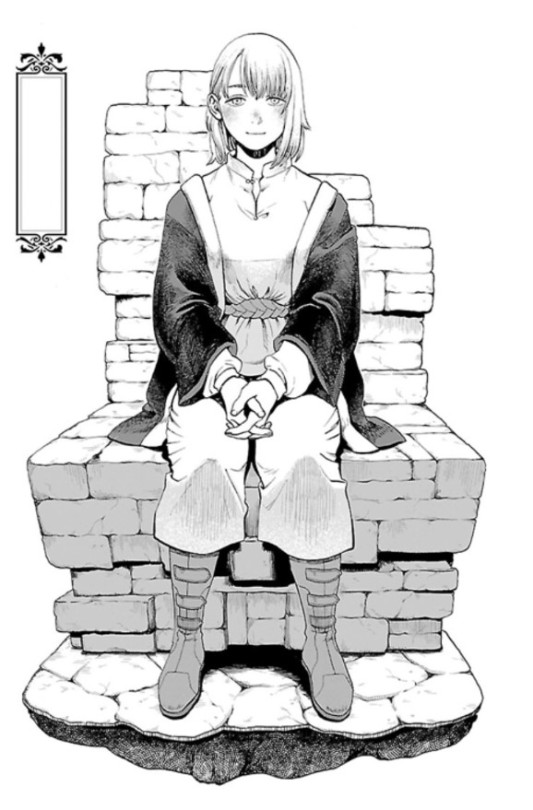
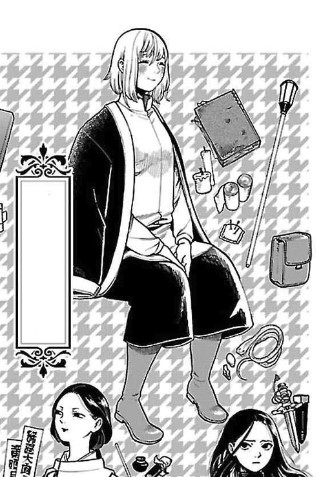
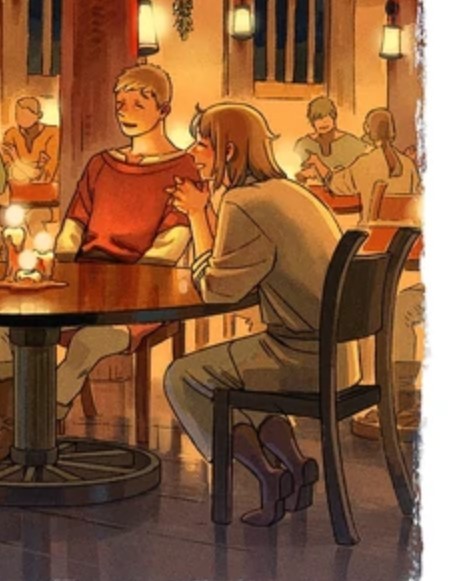
I accept that there might be an element of suggestion at play here, considering also how she is dressed most of the time, but I really do think there is a direct effort at differentiation here.
This is the first time in a long time (in a series like this at least) where i've seen a woman carrying herself around others and the space around here kind of like a person like me, tall, would; at first i didn't think much of it, but then i saw her near other characters and....i don't know, i felt a warm, joyful feeling, seeing that i was right in recognizing that trait and being right.
I was especially happy in seeing her next to marcille. not so much for the height difference, but for how different they were in proportions and mannerism. A lesser manga i fear would have used marcille's body type and way of moving and interacting as the default for most other girls, but here she was uniquely herself!
Now, i could've used more extreme exemples to show how this author rocks in body types representations (while aknowledging there could've been even more diversification still), given there are far larger, taller and stranger women, but to me, nailing the little, most subtle details in such a chirurgical manner shows a greater level of mastery and comprehension. As such, Falin left me with a deeper fascination than most other characters.
Sorry for this wall of text, but i needed to let my happy thoughts go, so that i could be free again uhuh.
Feel free to tell me that i'm wrong, or that i should just accept anime media as is. i'm just really happy Dungeon meshi exists as is and i want Ryoko Kui to keep refining her craft, and drawing beautiful women and dwarves.
Plus, this was very much a stream of consciousness, i didn't go into technical details about what i think conveyed what i described, but if someone is interested, or does not get what i'm saying (while expressing it in a curious and gentle way, i won't respond to spiteful assholes), i'll be happy to make a follow up post in which i try to dissect this! For example, i didn't reread the whole manga to find examples of her, i just went to the wiki uhuh. in a follow up post maybe i'll try to go through chapters and pick more specific examples of her.
Anyway, have a good day!
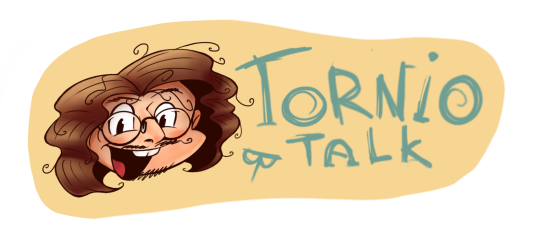
#tornio#tornioduva#torniod#fantasy#torniotalk#dungeon meshi#delicious#delicious in dungeon#dungeon food#ryoko kui please keep drawing beautiful people#ryoko kui#my head is free now i think#falin i want to hug you#Youtube
879 notes
·
View notes
Note
hi again i rlly liked ur headcanons for choi su-bong x shy fem reader and i was wondering if u could pls write headcanons of him x foreigner fem reader? ty and have a good day 🫶
ft. choi su-bong x f! reader — squid game
╰₊✧foreign! reader┊0.5k words
contains: headcanons!! reader’s native country is unspecified but she speaks her native language and english while studying korean!
➤ author's note: alright, this is the last for the short specific reader headcanons, the next thanos fic will be an actual one-shot <3

╰₊✧ notices you immediately both because you’re a cute girl and because you stand out in a crowd like he does. korea has a very homogeneous population, so people tend to take notice of you quickly. he probably greets you with a casual “what’s up” and decides right then and there that you’re going to be friends or maybe something more, you don’t really have a choice in the matter because people who stick out like you should stick together! he doesn’t mind if you’re shy because of your broken korean, he’s a master of language and wordplay and will gladly help you out!
╰₊✧ because he’s teaching you stuff he already knows and isn’t learning anything, he’s actually a lot of fun to study with. he always finds a way to make it fun and easy to remember with high-fives each time you get a question right. i feel like he was an awful student who went through a lot of tutors (only during exam season when he needed to get his grades up to pass the class though), so he knows all the best tips and tricks that worked on him when he was younger.
╰₊✧ is probably one of those guys who asks what the swear words are and what cultural insults there are. he wants to use them other people so that he can get away with saying shit to their faces without getting caught, something that he already does in english but would like to know more
╰₊✧ even if you may not fit traditional korean beauty standards, he thinks you’re so hot. might use the term “exotic” because he doesn’t know better, but he won’t use it again once you tell him that it’s objectifying.
╰₊✧ once you two start dating, he will seriously want to learn your native language. i can see him as someone who appreciates linguistics and admires multilingual people, loving to listen to music of all genres around the world and having a pretty diverse set of favorite artists. he might pout and bitch that it’s too difficult at first, but he’s surprisingly smart when he wants to be and will be conversationally fluent in about a year (it would be shorter if he was more consistent in his studies but alas).
╰₊✧ really looks forward to visiting your home country! he’ll try his best to be as respectful as his obnoxious ass can be, although i see him being accidentally offensive a few times because he can be a bit ignorant. loves to meet fans there and would probably go out of his way to make at least one appearance there if he ever had a worldwide concert tour no matter how off-course it may be.
╰₊✧ when it comes to meeting your family, he puts all of his knowledge to the test to win their approval (god knows he needs all the help he can get when he looks the way he does, especially if you have a conservative family). however, he doesn’t really care if they don’t approve of him as he finds it to be more of a bonus than a requirement.
╰₊✧ 100% wants to come back during your honeymoon, maybe even have a second wedding to adhere to your traditions if you so desire it. don’t worry about finances, he’s got it all covered!


175 notes
·
View notes
Text

#Homogenizer Pressure Gauge#Differential Gauge#Digital Pressure Gauge#Digital Temperature Gauge#pressure gauges#low pressure gauge#differential pressure gauge#standard pressure gauge#electric pressure gauge#economical pressure gauge#diaphargm seal pressure gauge#All SS Pressure Gauge
0 notes
Text
Writing Notes: Honey

Honey
Sweet, viscous liquid food, dark golden in colour, produced in the honey sacs of various bees from the nectar of flowers.
Flavour and colour are determined by the flowers from which the nectar is gathered.
Some of the most commercially desirable honeys are produced from clover by the domestic honeybee.
The nectar is ripened into honey by inversion of the major portion of its sucrose sugar into the sugars levulose (fructose) and dextrose (glucose) and by the removal of excess moisture.
Honey is marketed in several different forms: liquid honey, comb honey, and creamed honey. Sometimes the predominant floral type from which the honey was collected is indicated.
Liquid Honey
If liquid (strained, extracted) honey is desired, additional supers are added directly above the brood nest.
When one is largely filled, it is raised and another is placed underneath.
This may continue until several have been filled, each holding from 30 to 50 pounds (14 to 23 kilograms), or until the nectar flow has ended.
After the bees have evaporated the water until the honey is of the desired consistency and sealed in the cells, the combs are removed, the cells uncapped with the uncapping knife, and the honey extracted.
The removed honey is immediately heated to about 140 °F (60 °C), which thins it and destroys yeasts that can cause fermentation.
It is then strained of wax particles and pollen grains, cooled rapidly, and packaged for market.
Comb Honey
In production of honey in the comb, or comb honey, extreme care is necessary to prevent the bees’ swarming. The colony must be strong, and the bees must be crowded into the smallest space they will tolerate without swarming.
New frames or sections of a frame with extra-thin foundation wax, added at exactly the right time for the bees to fill without destroying them, are placed directly above the brood nest. The bees must fill and seal the new comb to permit removal within a few days, or it will be of inferior quality.
As rapidly as sections are removed, new sections are added, until the nectar flow subsides. Then these are removed and the colony given combs to store its honey for the winter.
Creamed Honey
Almost all honey will granulate or turn to sugar.
Such honey can be liquefied without materially affecting its quality by placing the container in water heated to about 150 °F (66 °C).
Liquid and granulated honey is sometimes blended, homogenized, and held at a cool temperature, which speeds uniformly fine granulation.
If properly processed, the granules will be extremely fine; the honey, which has a smooth, creamy appearance, is referred to as creamed honey.
Floral Types
Some honeys are sold by floral type; that is, they are given the name of the predominant flowers visited by the bees when they accumulated the honey.
The beekeeper has no way to direct the bees to a particular source of food but through experience learns which plants are the major sources of honey.
Different flowers produce different colours and flavours of honey. It may be heavy-bodied or thin-bodied, dark or light, mild-flavoured or strong-flavoured.
Most honey has been blended by the beekeeper to a standard grade that can be supplied and marketed year after year.
Different regions in California produce distinctive honeys:
Orange Blossom Honey: Sourced mainly from Southern California's vast citrus orchards.
Sage Honey: Harvested in the coastal areas and foothills.
Buckwheat Honey: Found in Northern California, with a robust, molasses-like flavor.
Sources: 1 2 3 ⚜ More: References ⚜ On Beekeeping ⚜ Writing Resources PDFs
#honey#writeblr#writing reference#literature#writers on tumblr#dark academia#spilled ink#writing prompt#creative writing#food#writing inspiration#writing ideas#light academia#writing resources
119 notes
·
View notes
Text
I stopped playing genshin awhile back less out of protest and more out of disappointment and frustration towards the game, so know that what I’m about to say is not an attack on genshin players because I too was there for a long time. I’m a strong believer in that all media— even the most highly regarded— will have issues and simply enjoying said media does not reflect on your values so long as you can recognize when something about it could be better. In general fandom bashing to me is a pointless endeavor that only hurts people’s feelings and is ALWAYS hypocritical because maybe you don’t like one thing that you deem bad but I can guarantee, right now, you also like something that has made mistakes.
With all that being said it makes me very frustrated when genshin fans act as if the only issue with the designs is the fact that they’re white. It misses the point. Sure, they would be better if they weren’t paper white, definitely a step in the right direction but genshin is beyond help. Natlan was just the final tipping point. At its core, genshin’s designs have fundamental issues. The colorism is the most obvious, but the lack of body diversity is also an issue. Not to mention the lack of hair texture or features, the way they homogenize culture, the stealing random cultural names or elements with no consideration for their origins, the orientalism, the age issue, and the sheer fact that their shape language/character design principles are just bad from a design standpoint. (I wrote a mini-essay on that part alone.) The list goes on.
Perfect example: I saw the new cow-girl design they released and she’s slightly wider than their other models, not even mid-size, but by genshin standards that’s fat and her defining trait is how much she eats, she’s literally a cow and one of her attacks is to accidentally sit on her opponent. Not to mention the fact that it’s supposed to be a stumble into a fall while in a tiny skirt which makes it feel suspiciously like fetish content. Fully sums up my entire point that genshin has fundamental problems with its characters.
There are plenty of people who speak out but there’s a very prevalent narrative amongst the fandom that (whether intentional or not) implies everything would be fixed if they just made them not white. And it irks me, because at this point it feels willfully obtuse. Again it’s fine to play the game, to enjoy it and interact with genshin content like you would any other fandom space but there’s a hypocrisy to the people who believe they’re speaking out by editing the skin tone and maybe adding some freckles. This is a nuanced thing. It’s about how the work is created. If you are simply an artist drawing a character with some of your headcanons that’s not an issue, it’s not even a statement really, it’s just artistic interpretation. What I’m specifically referring to is when people make edits/artwork with the intent of “fixing genshin” and the only thing that changes is skin tone.
To truly fix genshin’s designs you would have to start from scratch. And yknow what? Character designing for cultures we’re not apart of is really fucking hard and that’s why they have teams of people working on them. It’s a thin line to balance. As individuals it’s not really our responsibility to fix them but if you do walk into that territory (aka making art or edits with the intention of fixing), you do now hold some of that responsibility. I’ve seen several artists fall into this trap where they go in with pure intentions of trying to help but quickly find out how complicated it is, not only to design a good looking character, but one that respectfully includes real cultural elements (that they aren’t familiar with) and it goes poorly. Again this is why these projects have teams of people as well as diversity coordinators.
And I think the key aspect that makes designing for genshin really hard is that they will always be limited by being a fantasy setting that is almost entirely based on real world cultures. No matter the intention this type of world building makes it extremely easy to fall into offensive streotypes, because you aren’t just showcasing a real life culture, you have to take the additional step in making it into something new. We run into the issue of diluting real world cultures down to aesthetics or implying things for the purpose of narrative, among many other challenges. Inherently by making that leap into the second step we are in muddy waters. Even shows like ATLA—which are held in high regard for their integration of real world culture into their fantasy world building— still have issues (which is also a fascinating conversation but not on topic).
Suffice to say it’s really hard to do. But with the access to resources that Hoyoverse has, it’s ridiculous that these compounding issues continue to persist.
#just some reflection#almost scared to tag bc ik fans don’t like to hear criticism#just know the real enemy isn’t the fans it’s the company#genshin#txt
79 notes
·
View notes